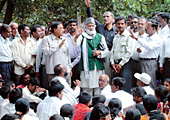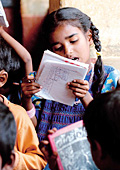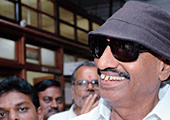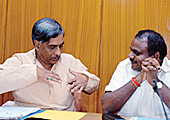 |
| Educators turn protestors: Sharma addresses
fellow teachers and members of KUSMA at a meeting |
SEPTEMBER
23-24, 2006
4 p.m., V.V. Puram, Bangalore
For
the most part, G.S. Sharma, the 82-year-old President of the Karnataka
Unaided School Management Association (KUSMA) and founder of the
five-decade-old SSVM Group, is a fairly placid and soft-spoken
person, who rarely finds reason to raise his voice or lose his
temper. However, the last week has given him plenty of opportunity
to throw a tantrum and harangue state government officials. His
main grouse: the Karnataka Government's plan to shutter 1,416
schools statewide for not sticking to Kannada as the medium of
instruction (up to class 5), which Education Minister Basavaraj
Horatti says has been mandated by a Government Order passed in
1994. Sharma says that the ruling contravenes a Supreme Court
(sc) judgment that allows instruction in any medium, and schools
that are compelled to close will take refuge behind this ruling.
"The government can't decide language of instruction of schools
and force them to use only Kannada. This is not followed anywhere
else in the country," he tells this writer in his first-floor
office in old Bangalore.
At various stages over the last few decades,
pro-Kannada agitations have rocked Karnataka and its cosmopolitan
capital Bangalore. These protests have been of various intensities
and against different languages (first Hindi, later Tamil, and
now English), and by maverick agitators such as Kannada Chaluvali
leader Vatal Nagaraj, who have led the vitriolic attack on the
state administration for its purportedly anti-Kannada stance.
This time around, however, ministers themselves seem to have become
votaries of the language chauvinism, with Horatti, the state's
Primary Education Minister, ordering the closures. His colleague
and Higher Education Minister D.H. Shankaramurthy causes a storm
of his own by declaring that the warrior Tipu Sultan, who until
recently was considered an icon for fighting the British, is anti-Kannada
for purportedly using Persian as his administrative language.
This remark is met with much derision, with noted littérateur
Girish Karnad launching a scathing attack on the statement stating,
"Everyone has the right to say something stupid, but I don't
think the Education Minister should exercise that right."
 |
| Just let us study: Village children
at the Kannada Primary School near Hennur in Bangalore |
Karnad, however, is not alone in launching
a stinging attack on the state government, with education experts
too queuing up to take pot shots at its "ridiculous"
plans. "The government has its priorities misplaced and shouldn't
be interfering with the medium of instruction, but look at issues
such as teacher training and frame rules on areas such as infrastructure
in schools," argues Padma Sarangapani, Visiting Fellow at
the National Institute of Advanced Studies, Bangalore. "The
government's decision is unwarranted since it puts thousands of
children's academic year in jeopardy," says Sharma. Horatti,
however, tells BT from Belgaum in North Karnataka (where the government
had organised a special legislature session to prove the city
is an "integral" part of Karnataka and not Maharashtra,
as some see it), that the government is firm on its plan to shutter
these schools and effectively leave 250,000 students without a
school to attend once the Dussehra holidays end in early October.
The next day, a horde of school principals,
teachers and parents address a press conference at the Bangalore
Press Club and claim they will run their institutions as private
tutorials if they are forced to shut. After the boisterous press
conference, everyone walks across to the verdant Cubbon Park to
hold a public meeting and then walk in procession to meet the
Chief Minister H.D. Kumaaraswaamy, to try to press their case.
"We are confident that the government will listen to our
plea," says Sharma, waiting in the corridors for the cm to
emerge from a meeting.
In an anteroom barely 10 metres away from
where we speak to Sharma, the maverick pro-Kannada legislator
Nagaraj is in no mood to budge. "These schools broke the
law in the first place and should therefore be punished immediately,"
the long-time activist-politician, who has been associated with
the movement for over two decades, tells an expectant group of
scribes outside the Committee Room in the Vidhana Soudha. He even
sneaks a quick meeting with Horatti, where (besides discussing
his plans for the Belgaum session) he presses upon the minister
the need for quick action against erring schools. "We must
protect the integrity of Kannada and Kannadigas," says Nagaraj.
 |
 |
| The key players: Kannada Chaluvali's
Nagaraj (top), and (bottom) Primary Education Minister Horatti
(left) with CM Kumaaraswaamy |
As expected, India Inc. has reacted with trepidation
over the latest rounds of language chauvinism, with the it industry
and beer baron Vijay Mallya attacking the pro-Kannada lobby. Mallya
leads the charge at the UB AGM, telling reporters on the sidelines
that the move is "a retrograde step" and that English
education needs to be encouraged. N.R. Narayana Murthy, Infosys'
non-executive Chairman, says the demand for English is widespread,
with even children of Infosys support staff demanding an English
education to work in a globalised world.
Despite these words, it appears that the
hardline Karnataka Government is unwilling to back down over the
schools' imbroglio. "These schools will be closed as they
have violated the government order... there is no two ways about
this," Horatti says after a chat with Nagaraj, as he strolls
towards a meeting with the cm. The school management, meanwhile,
forced with imminent closure backs off a little, but then comes
back swinging at the Government, by taking refuge under an sc
judgment allowing instruction in any medium. "We are teaching
in English based on popular demand... even the poorest people
want their children to learn English so that they can get jobs
in software," says Shameem Haseeb, who runs the Globe School
in North Bangalore. With a day-long bandh called for by the Karnataka
Rakshana Vedike on October 4, the latest round of language chauvinism
seems to have just begun.
|








